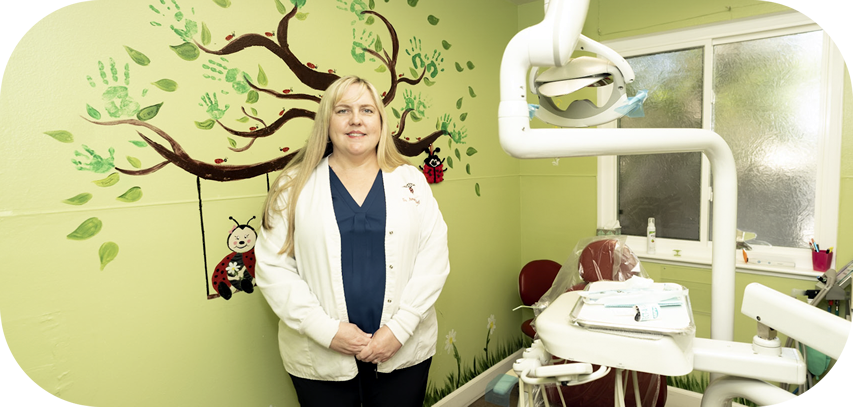SERVICES
General Dentistry Limited to Children
As your child’s dental home, we’ll focus on every smile-related detail. We work to make sure that every patient has healthy teeth, healthy gums, and healthy dental habits.

TREATMENTS
Services We Offer
Dental care is important from the moment the first tooth emerges (usually between 6 and 12 months.)
Dental Services
Preventive Care/Routine Checkup
Digital Xrays
Sealants
Tooth colored fillings
Baby root canals
Crowns
Nitrous Oxide (Laughing gas)
Space Maintainers
Habit appliances
LEARN MORE
Emergency and Dental Trauma
Toothache
Bleeding that can't be stopped
Swelling/Infection
Knocked out baby tooth
Knocked out permanent tooth
LEARN MORE
FAQ
Frequently Asked Questions
1AT WHAT AGE SHOULD MY CHILD HAVE HIS/HER FIRST DENTAL VISIT?
The ADA (American Dental Association) recommends that a child's first dental visit coincide with their first birthday or the eruption of their first teeth (whichever comes first). However, since many parents may feel that their children are not mature enough at this age to give the cooperation needed for a dental visit, a first dental appointment at 2-3 years of age may suffice. It is important to note, however, that any signs of cavities warrant an immediate dental visit regardless of age.
2WHAT CAUSES CAVITIES?
Cavities are caused by acid released from bacteria. Bacteria naturally occur in the mouth and are always present. The bacteria that cause cavities feed on
sugar. Once the bacteria feed on the sugar in a person's mouth, they release their cavity causing acid. The yellowish film that accumulates on teeth that are not being properly brushed is called plaque, and is actually the cavity causing bacteria.
3SHOULD MY CHILD BE FLOSSING?
The teeth of all children, regardless of age, should be flossed. Most children need help with flossing until they are at least seven or eight years old. Children and adults should floss at least one time per day (preferably at night prior to bedtime).
4SHOULD MY CHILD BE TAKING FLUORIDE SUPPLEMENTS?
Fluoride supplements are only necessary when the tap water in your com munity is not fluoridated and your child does not see his/her dentist on a
regular basis (Recommended at least once every six months).
5WHAT IS BABY BOTTLE SYNDROME?
Baby Bottle Syndrome occurs when a child is put to sleep with a bottle containing anything other than water on a consistent basis. If the fluid in the bottle (i.e. milk, juice, or soda) sits on a child's teeth while they sleep and is not immediately wiped away following the feeding, the sugar in the fluid causes cavities on the teeth. The cavities typically occur earlier and spread faster when the bottle is left in the child's mouth after they are put to bed. Baby Bottle Syndrome can also occur if a child takes a bottle past the age of 18 months, and/or if he/she carries a bottle around and is consistently taking any fluid other than water from it. The cavities in Baby Bottle Syndrome are typically more profound on the upper front teeth and the lower posterior (back) teeth since, this is where the liquid tends to pool. The treatment needed to restore the child's teeth depends on severity of the cavities. In many cases, crowns or even extractions are needed. *Putting your child to sleep by breast feeding and/or breastfeeding past the age of 18 months may lead to cavities.

